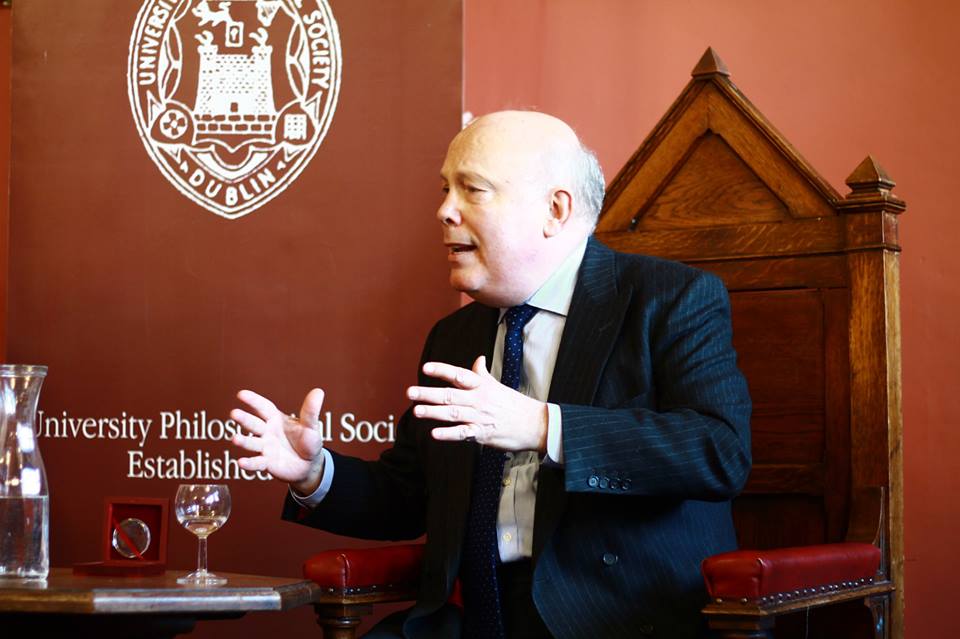Clare Droney | Senior Staff Writer
Creator, Executive Producer and Writer of Downton Abbey, Julian Fellowes, received the Gold Medal of Honorary Patronage from the University Philosophical Society (The Phil) for his contribution to film, theatre and television on Thursday last, 20th March. His “second career” as a screenwriter (Fellowes had been an actor for many years previously) was the focus of the event. Fellowes spoke on a range of topics, from his path to success as a writer to Downton’s characters and the drama’s recent controversial storylines.
“You can be sure that the next big sensation will be entirely different than the one the experts told you to look out for.”
Fellowes career as a screenwriter really began with the 2001 award-winning film Gosford Park. While the studio was initially apprehensive, given that he had never had a film produced before, Fellowes went on to win an Oscar for Best Screenplay for Gosford Park. His success as a writer includes a bestselling novel, Snobs, and his work as writer of Downton Abbey, ITV’s immensely popular British period drama. When the idea came up for Downton Abbey Fellowes noted that some people suggested that this kind of television was not as popular anymore, however ITV went on to produce the drama and it has become a huge success on both sides of the Atlantic.
Commenting on his success, Fellowes observed that “luck is an essential ingredient” and it is important to find “something you’re enthusiastic about.” He added: “In all the creative worlds people who stand up and tell you ‘this is the next big thing’ or ‘this is what the audience wants’ – they don’t know anything. You can be sure that the next big sensation will be entirely different than the one the experts told you to look out for.”
“The audience take possession of it and own it more than you do.”
Downton Abbey has been extremely popular, so much so that Fellowes commented that it has entered a new stage in which “the audience take possession of it and own it more than you do.” This point was picked up by Phil President Rosalind Ní Shúilleabháin in the question-and-answer session which followed. She asked Fellowes what he believed was the appeal of Downton Abbey, set in early twentieth-century Britain, for modern audiences. In response, Fellowes remarked that he believed it owed much to the “insecure feeling in this period” which made audiences look to Downton as a “more ordered, safe and secure era.” He highlighted that this security is largely an illusion – post-World War I Britain was an era of immense change – yet the manners and customs of the period allowed there to remain “a veneer of order”; “Period entertainment allows you to enjoy period life, enjoy the attractive sides of the period, without having to live through the disadvantages,” he observed.
The audience interest in the show has also led to public responses to controversial storylines. The rape storyline involving character Anna Bates was an inevitable topic raised during the question and answer session. Fellowes defended the storyline and highlighted the positive responses he has received from many women. “There are many women out there who have been victims of rape and who have somehow felt that the community believed they were in some tiny way to blame for what happened to them.” Fellowes feels strongly that “if one person feels better by seeing this storyline in which the victim is in no sense to blame then it’s worth doing it.”
“I do like to use phrases that sound modern because I think it shortens the gap between the audience and the characters.”
When asked about the importance of historical accuracy in creating a period drama, Fellowes emphasised the importance placed on historical accuracy by the show. While he has been accused of including modern phraseology in Downton Abbey, Fellowes defended this by stating that ‘slang’ or the loose usage of the English language is not only a modern phenomenon and the phrases used in the show are always checked to ensure that they are accurate for the time. However he admits, “I do like to use phrases that sound modern because I think it shortens the gap between the audience and the characters.” Downton’s creator believes that the show’s “deliberately modern feel” is one important appeal of the drama.
When asked about his writing method, Fellowes was quick to comment that he usually adheres to a “tough schedule”. He also advised “if you are writing for a living, one thing you must never do is wait until you have an idea, until you feel like writing.” Fellowes also indicated that in the future he may write an American series of the show and admitted he is somewhat apprehensive about writing for American television which often involves a higher number of episodes and writers’ rooms in which multiple writers are involved in the storyline.
Photo: The Phil







